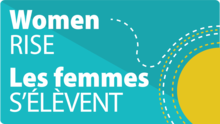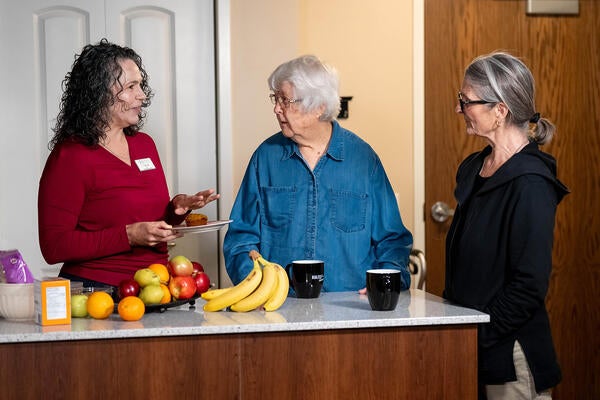
Seeking women’s health solutions in the context of COVID-19
Waterloo researchers use funding from IDRC Women RISE for action-based initiatives

Waterloo researchers use funding from IDRC Women RISE for action-based initiatives
By Jenna Braun For the Faculty of HealthUp to 92 per cent of women living in low-income countries are informally employed, meaning they do not receive a formal salary. These women have very little access to social protection, so whenever there is an economic downturn, like there was during the COVID-19 pandemic, they face a disproportionate loss of income.
“The most vulnerable people living in informal settlements in low-income countries have had their livelihoods most affected,” says Craig Janes, a public health sciences professor. “As we head into new phases of the pandemic and think about what comes next, it is important to enhance and expand our focus on these vulnerable populations.”
The International Development Research Centre (IDRC) has funded 23 research projects through an action-based initiative called Women RISE, whose projects aim to better understand the disproportionate impact COVID-19 has had on women’s health and livelihoods.
International research effort
 Janes is part of a team of researchers who received $1 million in funding for a Women RISE project focused on the impact COVID-19 has had on employment, economic status and HIV risk and vulnerability among women living in urban, informal settlements in Kampala and Mbale, Uganda. In addition to Janes, who is the Canadian lead, the lead Ugandan investigators are Susan Babirye from Makerere University and Daniel Byamukama from the Uganda AIDS Commission.
Janes is part of a team of researchers who received $1 million in funding for a Women RISE project focused on the impact COVID-19 has had on employment, economic status and HIV risk and vulnerability among women living in urban, informal settlements in Kampala and Mbale, Uganda. In addition to Janes, who is the Canadian lead, the lead Ugandan investigators are Susan Babirye from Makerere University and Daniel Byamukama from the Uganda AIDS Commission.
“We hope to learn more about how these women have experienced the pandemic, the economic consequences they have faced and their coping strategies,” Janes says.
Globally, women are overrepresented in sectors such as tourism, hospitality and retail, all of which were hit hard by the pandemic. These sectors place women on the front lines, increasing their risk to exposure, mental health issues and workplace violence.
“It is important to recognize that most health-care workers around the world are women. This is certainly true in Uganda, and it is not only those who are employed as nurses,” says Janes. “Women provide unpaid caregiving to the elderly and sick and are therefore more exposed to the disease.”
Poverty and HIV risk
With poverty comes a higher risk of HIV. Janes explains that families will often, particularly in situations of economic stress, marry off daughters at a very young age. These young women have very little power over their situation, and do not have the capability to influence their partner to use protection against HIV.
“You also see women having to make difficult decisions around engaging in transactional sex, exposing them to HIV risk at a much higher level than would be the case for women who have access to more resources.”
 Janes hopes to learn which resources these women have access to, particularly for those who are HIV positive. He will be working with non-governmental organizations, government and public sectors and providers of various kinds of services to better understand what these women need and where the gaps are.
Janes hopes to learn which resources these women have access to, particularly for those who are HIV positive. He will be working with non-governmental organizations, government and public sectors and providers of various kinds of services to better understand what these women need and where the gaps are.
The team will also be interviewing approximately 400 women living in informal settlements in poor communities in Kampala and Mbale in order to appreciate the women’s perspectives through their lived experiences.
“These projects are designed to bring together university-level researchers with policy-makers and non-governmental organizations,” Janes says. “So, there are researchers trying to answer questions, and then people who actually do something with that information.”
Putting research into practice
Environment professor Susan Elliott is part of another Waterloo team that received $1 million in funding for one of the Women RISE projects. Elliott’s project will spotlight the voices of women in Kenya and Uganda from all socio-economic backgrounds following the COVID-19 pandemic.
Ongoing communication and knowledge transfer between the 23 teams is facilitated by the African Population and Health Research Center in Nairobi, Kenya. They ensure that research is conclusively put into practice, converting project results into gender-transformative policies and programs.
“We have a very diverse global health ecosystem here at the University of Waterloo,” Janes says. “Consistent with Waterloo’s trademark approach to impactful scholarship, this integrated approach makes sure that knowledge is being used in the best way possible.”

Read more
The Government of Canada announces funding to support research in food policies and medical devices

Read more
How machine learning empowers collaboration between computer science, math and medical research

Read more
Dr. Heather Keller discusses the need to transform mealtimes in Canada’s long-term care homes from a service to a meaningful form of care
The University of Waterloo acknowledges that much of our work takes place on the traditional territory of the Neutral, Anishinaabeg, and Haudenosaunee peoples. Our main campus is situated on the Haldimand Tract, the land granted to the Six Nations that includes six miles on each side of the Grand River. Our active work toward reconciliation takes place across our campuses through research, learning, teaching, and community building, and is co-ordinated within the Office of Indigenous Relations.